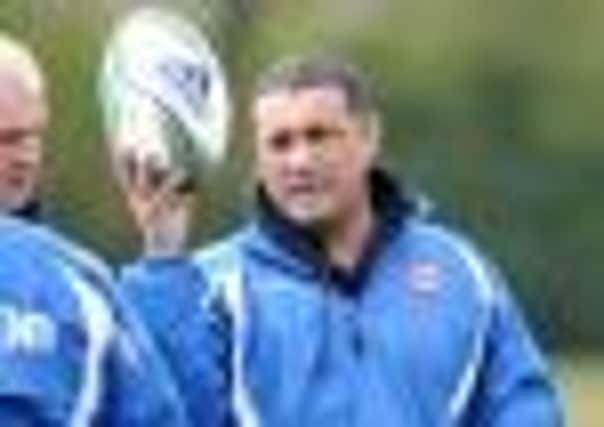David Barnes: Bradley’s Edinburgh reign comes to sorry end


It was widely anticipated that Michael Bradley’s contract would not be renewed in the summer – but confirmation of this fact refocuses the mind on just how disappointing Edinburgh’s season has been, and just how precarious the professional pyramid is at the top of the game in this country.
Edinburgh have managed only four wins in 20 competitive matches so far this season. They are currently fourth from bottom of the Rabo Direct Pro 12 table, and were dumped out of the Heineken Cup at the first hurdle having lost all six of their pool matches – with particular low points including a humiliating 45-0 mauling at home to Saracens, and a 33-0 defeat over in Munster a week later.
Advertisement
Hide AdAdvertisement
Hide AdThis is a sorry end to a coaching story which had at one point promised so much. Bradley may have been a surprise choice for the job when he was unveiled as Rob Moffat’s successor in the Edinburgh hot-seat back in May 2011 – but his first season in charge brought unprecedented success for a Scottish team in European club rugby’s flagship tournament.
Edinburgh’s march to the Heineken Cup semi-finals was as thrilling as it was unexpected. It started off with a hard-earned victory away to London Irish, but really kicked into gear the following week at Murrayfield, when they mounted one of the most sensational fightbacks in the competition’s history to secure a famous 48-47 victory over Racing Metro.
The capital would only lose one pool match (away to Cardiff Blues), to finish top of their group and earn a home quarter-final showdown against Toulouse. Then in front of a record 37,881 crowd they toppled the French giants to become the first Scottish team to make it into the last four of the Heineken Cup.
Ulster in Dublin proved too strong for Bradley’s troops, but it had been an exhilarating European voyage which went a long way towards over-shadowing a disappointing league campaign in which Edinburgh finished second from bottom in the Rabo table.
Hopes were high that the capital outfit were finally ready to kick-on and become a genuine European force, and Bradley used the biggest budget increase an Edinburgh coach has ever had to recruit extensively over the summer. Former England and Lions flanker Neil Back was also brought into the fold as forwards coach.
Despite an opening weekend loss at home to Munster, the 2012-13 campaign got off to a promising start with Edinburgh winning their next two matches – but when things started to unravel Bradley seemed helpless to stop the drift.
It quickly became clear that too many of the players he had brought in were no better, and in several cases much worse, than the individuals already at the club. The loss of stalwarts Chris Paterson (retirement) and Mike Blair (signed to Brive in France) was also felt more acutely than many had anticipated.
The Irishman will see out the season with Edinburgh, but his defence coach, Billy McGinty, has resigned with immediate effect. Back has a year left on his contract and, as an ambitious young coach, he would presumably be interested in taking on the lead role.
Advertisement
Hide AdAdvertisement
Hide AdAs a strategic short-term solution, the SRU may try to team up Back with a couple of emerging Scottish coaches – such as Simon Cross (Edinburgh Academicals and Scotland under-20s) and Kenny Murray (Ayr) – for next season.
Sean Lineen’s name is also likely to be linked with the job, although this might be viewed as a major climb-down by the SRU, just a year after he was controversially shunted from the same job with Glasgow to a rather obscure role as head of player acquisition.
In the past, professional coaching experience has been regarded by the SRU as being essential for any applicant to a job such as this, which would make George Graham (the former Scotland forwardscoach, who has overseen a remarkable transformation of Gala during the last four and a half years) the only viable candidate from the Scottish domestic scene.
At this stage, Craig Chalmers would appear to be out of the frame.
It was announced last week that the former Scotland stand-off is leaving Melrose at the end of the season and moving to London for personal reasons – however he would surely find it hard to resist the lure of a job at Edinburgh.
On purely rugby and nationalistic grounds, a Graham and Chalmers double act would be the dream ticket for a large section of Scottish rugby’s rank and file.